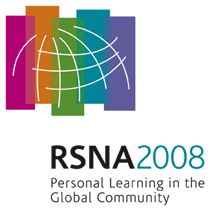
Abstract Archives of the RSNA, 2008
Joseph J. Budovec MD, Presenter: Nothing to Disclose
W. Dennis Foley MD, Abstract Co-Author: Investigator, General Electric Company
Medical Advisory Board, General Electric Company
Medical Advisory Board, EZM Incorporated
Wenhui Wu MD, Abstract Co-Author: Nothing to Disclose
Study aim was to compare radiation dose, contrast load, thoracic aortic attenuation values and image quality parameters of MDCT angiographic studies of the thoracic aorta performed with prospective (PG) and retrospective (RG) cardiac gating.
Study cohort was 80 patients referred for thoracic aortic CT angiography: equal numbers performed with PG and RG gating. Studies were performed for suspected aneurysm (n=23), dissection (n=36), post-surgical/intervention followup of treated aneurysm or dissection (n=21). Age (mean ± SD) in PG group 60 ± 13.8 years and in RG group 55 ± 14.4 years. Patient weight, PG group 194 ± 50.64 lbs and RG group 197 ± 60.34 lbs. Images were acquired on a 64 MDCT (LightSpeed VCT-GE Healthcare) - 120kvp, ma (PG) 450, 550, 750 (small, medium, large patients) and 150ms of additional tube-on time centered at 75% R-R. peak, ma (RG) 450, 550, 750 (small, medium, large patients) at 70-80% R-R , heart rate < 65 and at 40-80% R-R heart rate > 65 bpm. Radiation dose (CTDIvolume and dose length product) were obtained from image archival data. Contrast load and thoracic aortic attenuation values were obtained from a data registry. Comparative degree of motion artifact and banding artifact of the thoracic aorta was assessed in parasagittal reformatted MIP images and motion unsharpness of aortic valve assessed from reformatted images in the plane of the valve.
CTDIvolume and DLP PG group 28.8 ± 2.1mgy and 833.7 ± 1115.77mgy/cm. Comparative values in the RG group were 74.7 ± 13.42mgy and 2547.3 ± 553.27mgy/cm. Contrast material load (mean ± SD) PG group 109.1 ± 14.4ml and in the RG group 101.3 ± 10.45ml. Comparative aortic attenuation values for the PG/RG group were: ascending aorta 447.6HU/350.2HU, aortic arch 413.6HU/325.7HU, mid descending aorta 418.2HU/327.6HU and supra celiac abdominal aorta 355HU/306HU. Subjective scoring of motion artifact and banding artifact in the thoracic aorta and aortic valve was equivalent between the two groups.
Prospectively gated thoracic aortic CT angiography was associated with lower radiation dose, slightly increased contrast load, increased aortic attenuation values and equivalent assessment of image quality.
PG Thoracic CTA preferred over RG technique for study of ascending aortic pathology due to significantly lower radiation dose and equivalent image quality with minimal increase in contrast load.
Budovec, J,
Foley, W,
Wu, W,
Prospective and Retrospective EKG Gating for Thoracic CT Angiography: A Comparative Study. Radiological Society of North America 2008 Scientific Assembly and Annual Meeting, February 18 - February 20, 2008 ,Chicago IL.
http://archive.rsna.org/2008/6016954.html

